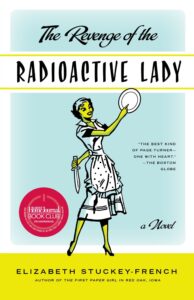
Upon first glance, anything called The Revenge of the Radioactive Lady seems like a fairly far-fetched premise, perhaps even science-fictiony. But sometimes facts truly are stranger than fiction.
Elizabeth Stuckey-French’s latest novel is a fictional tale, but it is based entirely on a set of rather gruesome facts from our nation’s medical history. During the Cold War, doctors were pressured by the Department of Defense to measure how much radiation exposure someone could survive, ostensibly to prepare for an imminent Russian attack. Stuckey-French’s novel introduces us to a woman who was on the receiving end of these treatments and watched her daughter die of cancer as a direct result.
The story follows the protagonist on a rather madcap adventure as she attempts to exact revenge on the doctor who performed the treatments. Despite the heavy premise of the book, the narrative is an often hilarious romp through a fictional Tallahassee neighborhood, addressing significant topics about family dynamics along the way.
Stuckey-French has just finished another novel, a murder mystery set in a 1960’s Home Ec Practice House on a college campus. Her trademark mix of serious and silly, said Stuckey-French, is hard-won.
“I remember going to a ballet and thinking the performance looked so fluid and effortless, but we didn’t see all the hard work it took to make it look that way,” she said. “I think the same thing is true for writing—people probably don’t realize how hard it is. You read a good book and you think it must’ve come easily. It hardly ever does.”
Stuckey-French said she’s pretty sure most people start writing fiction with confidence, but when their first effort doesn’t match their ideas or isn’t very good, they give up.
“You have to be willing to really work at it,” she said. “Writers write because they can’t not write. If that’s not true of you, you might want to try something else.”
Stuckey-French found her way into writing fiction by first writing for a public relations newsletter, then quickly realizing she liked making things up more than writing about facts. Once she took a fiction writing course, she was hooked.
“In hindsight, that may have made me appreciate the outcome more,” she said. And after reading The Revenge of the Radioactive Lady, I have to admit I appreciate the outcome, too.
This article was first published by Midtown Reader.
